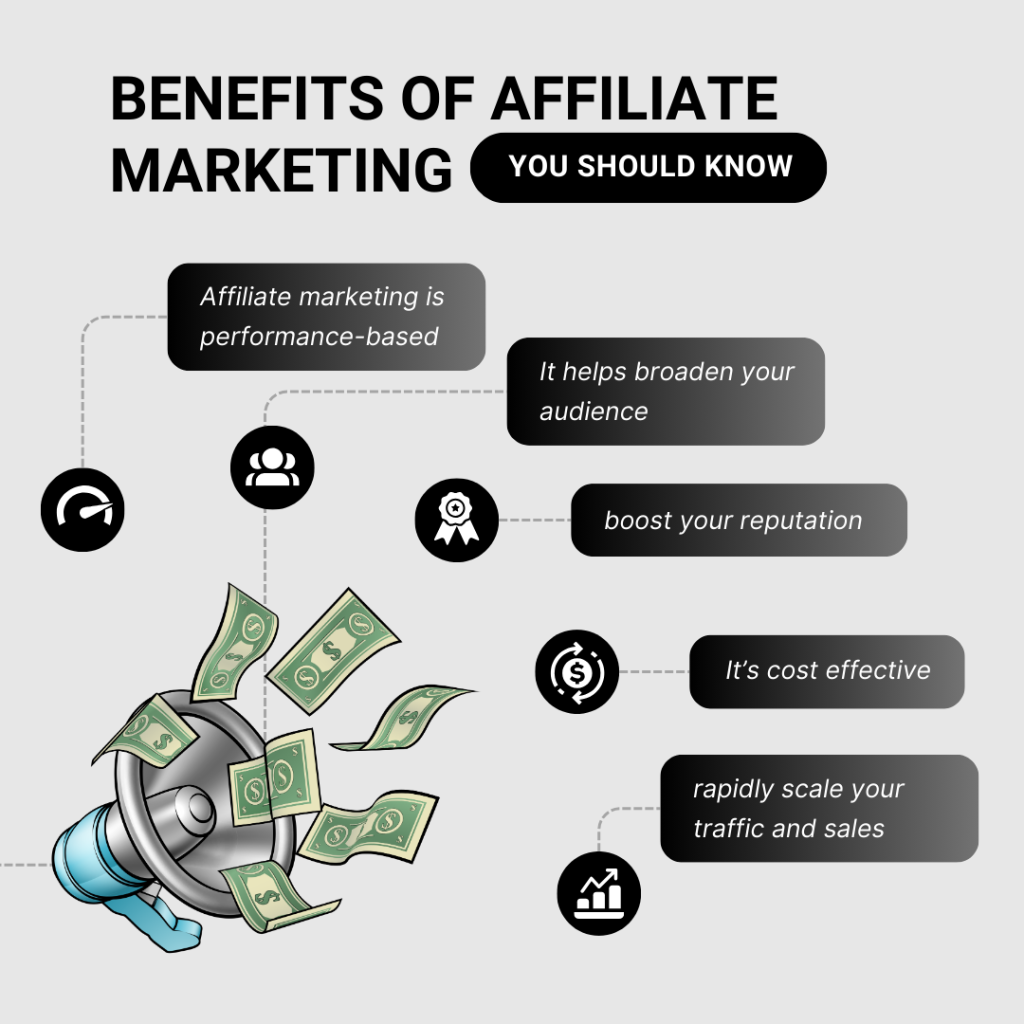Affiliate marketing has emerged as a lucrative way for individuals and businesses to generate income online. It offers an opportunity to partner with companies and promote their products or services in exchange for a commission. If you’re looking to dive into the world of affiliate marketing, this comprehensive guide will take you through the essential steps to get started and provide you with the knowledge needed to thrive in this competitive field.
Table of Contents
- 1. Understanding Affiliate Marketing
- 2. Choosing Your Niche
- 3. Researching Affiliate Programs
- 4. Building a Platform
- 5. Creating Valuable Content
- 6. Implementing SEO Strategies
- 7. Promoting Affiliate Products
- 8. Building an Email List
- 9. Tracking and Analytics
- 10. Comply with Regulations
- 11. Be Patient and Persistent
- 12. Scaling Your Efforts
- Conclusion

1. Understanding Affiliate Marketing
Before you begin, it’s crucial to have a solid understanding of affiliate marketing. In essence, it’s a performance-based marketing strategy where you earn a commission for driving traffic or sales to a company’s website through your unique affiliate links.
Affiliate marketing operates on a simple principle: you promote someone else’s product or service, and when a sale or action is completed through your referral, you earn a commission. The more referrals you drive, the more you can earn.
2. Choosing Your Niche
Selecting the right niche is a pivotal step in affiliate marketing. Your chosen niche will shape your content, audience, and overall strategy. Here are some steps to help you choose the right niche:
- Passion and Knowledge: Opt for a niche that you are passionate about or have expertise in. Your genuine interest in the topic will make your content more engaging and credible.
- Market Research: Conduct thorough market research to identify niches with demand and competition. Tools like Google Trends, keyword research tools, and social media can provide valuable insights.
- Profitability: Evaluate the potential profitability of your chosen niche. Are there affiliate programs with high commission rates and valuable products or services?
- Longevity: Consider the long-term viability of your niche. Is it a trend or something that will have lasting relevance?
3. Researching Affiliate Programs
Once you’ve chosen your niche, the next step is to find affiliate programs that align with your chosen niche. Here’s how to do it:
- Affiliate Networks: Explore popular affiliate networks for massive commission given below
- Direct Partnerships: Some companies run their affiliate programs independently. Research companies in your niche and visit their websites to see if they offer affiliate programs.
- Analyze Commission Structures: Compare commission rates, payment methods, and cookie durations (the time frame in which you can earn a commission after a referral) to choose programs that offer favorable terms.
- Read Reviews: Look for reviews and feedback from affiliates who have experience with the programs you’re considering. This can give you valuable insights into their reliability and performance.
4. Building a Platform
To succeed in affiliate marketing, you need a platform to promote products or services. Your platform serves as the medium through which you connect with your audience and present affiliate offers. Here are some platform options:
- Blog: Creating a blog is a popular choice for affiliate marketers. It allows you to publish informative articles, reviews, and guides related to your niche. Platforms like WordPress and Blogger make it easy to set up a blog.
- Website: If you have the technical skills or resources, building a website from scratch can give you more control and customization options than a blog. This is especially valuable if you plan to expand your affiliate marketing efforts over time.
- Social Media: Establishing a presence on social media platforms like Instagram, YouTube, or Facebook can be an effective way to reach a large audience quickly. Each platform has its strengths, so choose the one(s) that align with your niche and strengths.
- Email List: Building an email list is a valuable asset in affiliate marketing. It allows you to nurture relationships with your audience and promote affiliate products through newsletters and targeted campaigns.
5. Creating Valuable Content
Content is the cornerstone of your affiliate marketing strategy. High-quality, valuable content not only attracts and retains your audience but also converts them into customers. Here are some content creation tips:
- Know Your Audience: Understand the needs, preferences, and pain points of your target audience. Tailor your content to address their specific problems and interests.
- Content Types: Experiment with various content types such as blog posts, product reviews, video tutorials, infographics, podcasts, and more. Different formats resonate with different audiences.
- SEO Optimization: Implement SEO (Search Engine Optimization) strategies to improve your content’s visibility in search engines. Research relevant keywords, optimize meta descriptions, and create valuable, well-structured content.
- Storytelling: Engage your audience through storytelling. Share personal anecdotes, case studies, and success stories related to the products or services you promote.
- Honesty and Transparency: Build trust with your audience by being honest and transparent in your content. Disclose your affiliate relationships and provide unbiased reviews and recommendations.
6. Implementing SEO Strategies
Effective SEO strategies are crucial for driving organic traffic to your platform. Here are some advanced SEO tips for affiliate marketers:
- Keyword Research: Go beyond basic keyword research. Identify long-tail keywords with lower competition and higher conversion potential.
- Backlink Building: Earn high-quality backlinks from authoritative websites in your niche. Guest posting, outreach, and creating shareable content are effective backlink strategies.
- Mobile Optimization: Ensure that your website or platform is mobile-friendly. Mobile optimization is a ranking factor in search engines like Google.
- User Experience: Focus on providing an excellent user experience. Optimize page load times, improve site navigation, and make your content easily accessible.
- Local SEO: If your niche has a local component, optimize your content for local search. This is especially relevant for affiliate marketers promoting products or services with physical locations.
7. Promoting Affiliate Products
Promotion is the core of affiliate marketing. You need to effectively promote affiliate products to earn commissions. Here are some promotion strategies:
- Content Integration: Integrate affiliate links naturally within your content where they provide value. For example, in product reviews, tutorials, or top 10 lists.
- Call to Action (CTA): Use compelling CTAs to encourage your audience to take action. Make sure your CTAs are clear, concise, and persuasive.
- A/B Testing: Experiment with different promotional strategies to see what works best for your audience. A/B testing can help you optimize your approach.
- Product Comparisons: Create comparison articles or videos that highlight the benefits of the affiliate product compared to competitors. This helps your audience make informed decisions.
- Limited-Time Offers: Promote affiliate products with limited-time offers or discounts. Scarcity can drive conversions.
You may like these
How to Improve Your Email Marketing Strategy with AI-Powered Bots
8. Building an Email List
Building and nurturing an email list is a valuable asset for affiliate marketers. Here’s how to effectively grow and leverage your email list:
- Lead Magnets: Offer valuable lead magnets such as eBooks, guides, or exclusive content in exchange for email sign-ups.
- Segmentation: Segment your email list based on user behavior, interests, or demographics. This allows you to send targeted and relevant affiliate offers.
- Email Sequences: Create automated email sequences that provide value and build trust with your subscribers before promoting affiliate products.
- Testing and Optimization (Continued): Continuously test different email strategies to improve open rates, click-through rates, and conversion rates. A/B testing subject lines, email content, and sending times can provide valuable insights.
- Compliance: Ensure that your email marketing practices comply with relevant regulations, such as the CAN-SPAM Act in the United States. Include clear opt-out options and maintain a clean, up-to-date email list.
9. Tracking and Analytics
To measure the success of your affiliate marketing efforts, you need robust tracking and analytics tools. Here’s how to effectively use them:
- Google Analytics: Set up Google Analytics to track website traffic, user behavior, and conversions. This data helps you understand which affiliate strategies are working and where you need improvement.
- Affiliate Dashboard: Most affiliate programs provide a dashboard where you can track clicks, conversions, and commissions. Regularly review this data to assess your performance.
- Conversion Tracking: Implement conversion tracking tools to monitor the specific actions that lead to affiliate commissions, such as sales, sign-ups, or downloads.
- ROI Analysis: Calculate your return on investment (ROI) for each affiliate campaign. This helps you allocate resources to the most profitable strategies.
10. Comply with Regulations
Affiliate marketing is subject to various regulations and guidelines, depending on your location and the locations of your audience and affiliate partners. Compliance is crucial to maintain trust and avoid legal issues. Here’s what you should consider:
- Affiliate Disclosures: Clearly disclose your affiliate relationships to your audience. Use statements like “This post contains affiliate links” to maintain transparency.
- Privacy Regulations: Understand and adhere to data privacy regulations, such as the General Data Protection Regulation (GDPR) in the European Union.
- FTC Guidelines: If you’re targeting an audience in the United States, be aware of the Federal Trade Commission (FTC) guidelines for endorsements and testimonials.
- Taxation: Depending on your location, you may be required to report and pay taxes on your affiliate income. Consult a tax professional for guidance.
11. Be Patient and Persistent
It’s important to manage your expectations in affiliate marketing. Success doesn’t happen overnight, and it often takes time to build a sustainable income. Here are some tips for staying patient and persistent:
- Set Realistic Goals: Define achievable goals for your affiliate marketing journey. These goals can be related to earnings, audience growth, or content production.
- Consistency: Consistency is key in affiliate marketing. Regularly produce content, engage with your audience, and refine your strategies over time.
- Learn and Adapt: Stay open to learning and adapting. The digital landscape is always evolving, so be prepared to pivot when necessary.
12. Scaling Your Efforts
As you gain experience and see results, consider scaling your affiliate marketing efforts to increase your earnings and reach. Here are some strategies for scaling:
- Diversify Niches: Explore new niches that align with your interests or expertise. Expanding into multiple niches can diversify your income streams.
- Multiple Platforms: Expand your presence across multiple platforms, such as social media, YouTube, and email marketing. Each platform can reach a different segment of your audience.
- Outsourcing: Consider outsourcing tasks like content creation, SEO, or email marketing to experts in those areas. This frees up your time for strategy and growth.
- Networking: Build relationships with other affiliate marketers and industry professionals. Networking can lead to collaboration opportunities and valuable insights.
Conclusion
Starting affiliate marketing may seem daunting at first, but with the right approach and dedication, it can become a profitable venture. Remember that building trust with your audience, creating valuable content, and choosing the right affiliate programs are keys to your success. So, roll up your sleeves, follow these steps, and embark on your affiliate marketing journey with confidence. Your success awaits!
Affiliate marketing is a dynamic field that rewards those who are willing to put in the effort and adapt to changing trends. Stay informed, keep learning, and consistently provide value to your audience. With time and perseverance, you can turn your affiliate marketing venture into a sustainable source of income and achieve your financial goals.








